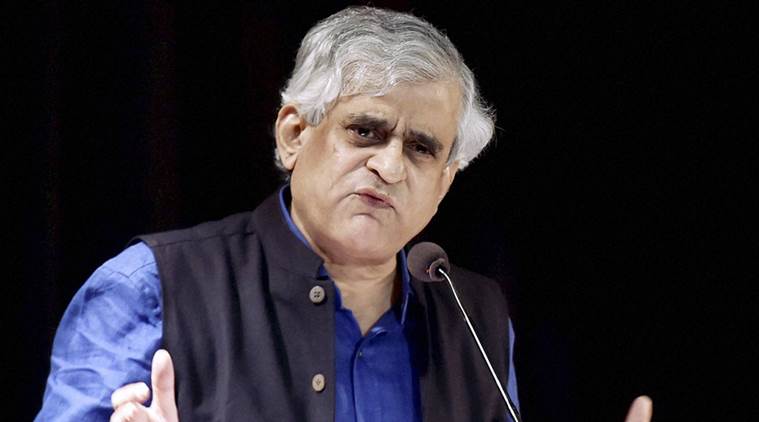Farmers’ protest in Delhi: Modi govt has lied through its teeth on MSP, says P. Sainath | India News, The Indian Express

Founder-Editor of the People’s Archive of Rural India and agrarian expert P. Sainath talks to Shalini Nair on the aim of the two-day long Kisan Mukti March in Delhi to bring the various aspects of farm distress into the national discourse.
Besides the passage of the two bills – on loan waiver and guaranteed remunerative prices for produce – what does the Kisan Mukti Morcha hope to gain from this march?
As important as they are, the two bills are the first step. They are not a comprehensive closure of the agrarian crisis. They have a long way to go. You cannot resolve the agrarian crisis if you do not engage with the rights and entitlements of those who do the greatest amount of work in agriculture, which is mahila kisan. There was a 2011 private member bill introduced by MS Swaminathan which has already lapsed. You cannot say that I will solve this crisis without taking into account women, the ones who contribute 60% of the labour in agriculture. You cannot say that we can solve a crisis if you do not address the issue of land rights of a Dalit kisan, forest rights of an Adivasi kisan or the rights of tenant farmers who are an unbelievably exploited and a vulnerable lot.
All these sections have to be given their due and brought back into the national discourse. The march in Delhi has brought out a huge contingent of middle classes in support of the farmers. This march is the beginning and not a culmination. Hopefully, it is a historic beginning.
What other issues does this march hope to bring specifically under focus?
It (the session) should address the burning issues of MSP (Minimum Support Price) and farmer debts. Then, there is the gigantic water crisis in the country. Water is plundered and privatised. In Marathwada, where women in times of scarcity pay 45 paise a litre, alcohol factories pay 4 paise a litre. Thirty years ago, these workers paid 1 paise per litre. These workers now put four paise worth of water in plastic bottles and sell it to you for twenty rupees.
There is a mega water crisis that is engulfing this country, a crisis that is bigger than a drought. It has a lot to do with the five forms of water transfer: from the poor to the rich, from the village to the city, food crop to cash crop, livelihood to lifestyle and agriculture to industry. These are the kinds of water transfer that are taking place and those deprived of water have no voice in any of this.
You cannot solve your agrarian crisis by continuing the trend of declining public investment in agriculture. Only for a period while in UPA 1 for three years, that trend was reserved but again later, there was a decline in investment in agriculture. All these issues need to be discussed.
Besides this, there should be a national debate on the kind of an agriculture we want 20-30 years from now. Do we want a corporate-driven agriculture or a community-owned agriculture which is the basis of Indian existence? Do you want a chemical-driven agriculture, an agriculture which is indifferent to climate change or do you want an agriculture based on agro-ecological principle and practice? They have to get the victims of the agrarian crisis to stand in the central hall of Parliament for three days and explain to the nation what the agrarian crisis actually means and what it has done to them.
You mentioned the importance of putting the focus (of the discussion) on the issues of women, Dalit, Adivasi, and tenant farmers. Could you elaborate on this a bit?
Less than eight per cent of the women in this country has land registered after their own name. So, it shows that you don’t recognise their property right; you don’t recognise them as farmers too. You call them the farmers’ wives or farmers’ daughters or farmers’ mothers. They are the people who carry out the maximum amount of work in agriculture. When we think of a farmer, we think of a guy with a plough or, if it in Punjab, a guy on a tractor. That is completely misleading in terms of the amount of work carried out by women in agriculture. You have to look at their land rights.
A land is a gigantic issue. If you cannot look at the land issue of all these groups, you cannot solve the crisis. What about legislation to protect the rights of the tenant farmers? No one is doing it. They can’t even get bank loans. For the Adivasi farmer who has lived 1,000 years in a particular place, it is completely bewildering when the state suddenly comes along and says “where is your patta, you are an encroacher”. The correct implementation and realisation of their rights under the Forest Rights Act have to be done.
Twenty-one political parties have backed the private members’ bills drafted by the All India Kisan Sangharsh Coordination Committee. What has been the BJP’s stand on this?
The two bills can be passed in two days because 21 political parties have declared support to those bills. We need a three-week long session to discuss the remaining issues. The BJP’s stance has changed so many times in the last six years. They got elected on the promise of giving the cost of production besides 50 percent (MSP as recommended in the Swaminathan Commission). Since then, they have held five to six different positions in the next two years. And they have lied through their teeth on the implementation of the MSP. If they want to sign that bill into power, that will be good.
All Parliament members are invited to sign the petition Nation for Farmers which has been uploaded on the DilliChalo website. We have also appealed to the President to convene this special session.
Has the march in Delhi received a response anywhere similar to the what the farmers on the ‘Long March’ from Nashik received in Mumbai?
Astonishing varieties of people have joined the march. There are scientists, bureaucrats, doctors, teachers, student volunteers. Among the many who joined the march to show their solidarity to the cause was former Central Information Commissioner Sridhar Acharyulu. The Nashik to Mumbai march served as an inspiration. On that day, doctors from JJ hospital came to treat the farmers, teachers and students of local colleges volunteered and ordinary people distributed food and water packets. That is when I saw before me a nation for farmers. That’s how the idea of that forum was formed.
Every city has been putting up its own Nation for Farmers (campaign). People have come here from across 20 odd states. The protest has been slightly hit because of the elections in Madhya Pradesh and Rajasthan. In Rajasthan, several kisan leaders are contesting the elections. There are farmers from MP who took a train immediately after casting their vote on Wednesday. The Delhi government has been of great help. Chief Minister Arvind Kejriwal told me that he would greet the farmers himself and that they were welcome to the capital; it is their country, it is their city. Services such as ambulances, water, toilets have been extended to the marchers by the Delhi government.

